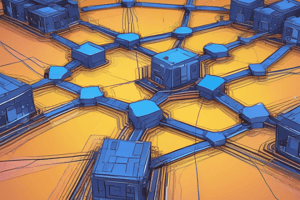Podcast
Questions and Answers
Modern networking trends place an increasing burden on system and networking ______.
Modern networking trends place an increasing burden on system and networking ______.
administrators
The increase in capacity of network transmission technologies has been matched by an increase in the performance of network ______.
The increase in capacity of network transmission technologies has been matched by an increase in the performance of network ______.
devices
The volume and variety of network traffic are generated by sources such as big data, cloud computing, IoT, and ______.
The volume and variety of network traffic are generated by sources such as big data, cloud computing, IoT, and ______.
mobile traffic
To respond to differing levels of QoS, network traffic has grown more complex and difficult to ______.
To respond to differing levels of QoS, network traffic has grown more complex and difficult to ______.
Year by year, network devices have larger, faster memories, enabling greater buffer capacity and faster buffer ______.
Year by year, network devices have larger, faster memories, enabling greater buffer capacity and faster buffer ______.
Increasing ______ and complex traffic patterns are driving network providers to reevaluate traditional approaches.
Increasing ______ and complex traffic patterns are driving network providers to reevaluate traditional approaches.
The networking landscape is evolving with an increase in user ______ and service delivery expectations.
The networking landscape is evolving with an increase in user ______ and service delivery expectations.
Intrusion detection system/intrusion prevention systems (IDS/IPS) are examples of network ______ that have improved over time.
Intrusion detection system/intrusion prevention systems (IDS/IPS) are examples of network ______ that have improved over time.
SDN offers a centralized, programmable network that consists of an SDN ______, southbound APIs, and northbound APIs.
SDN offers a centralized, programmable network that consists of an SDN ______, southbound APIs, and northbound APIs.
Traditionally, the two key functions of a router are ______ and routing.
Traditionally, the two key functions of a router are ______ and routing.
The SDN approach splits the two functions between a ______ plane and a control plane.
The SDN approach splits the two functions between a ______ plane and a control plane.
Before SDN, the data and control planes essentially functioned as ______.
Before SDN, the data and control planes essentially functioned as ______.
In traditional networks, routing determines the ______ taken by packets from source to destination.
In traditional networks, routing determines the ______ taken by packets from source to destination.
Traditional network architectures often face issues such as static, complex architecture leading to ______.
Traditional network architectures often face issues such as static, complex architecture leading to ______.
SDN uses networking software (controller) to ______ the network.
SDN uses networking software (controller) to ______ the network.
The decisions of what to do with the data are made on the ______ plane.
The decisions of what to do with the data are made on the ______ plane.
Inconsistent policies necessitate configuration changes to ______ devices and mechanisms.
Inconsistent policies necessitate configuration changes to ______ devices and mechanisms.
The inability to ______ leads to challenges as demands on networks grow both in volume and variety.
The inability to ______ leads to challenges as demands on networks grow both in volume and variety.
SDN added new features and ______ to network devices.
SDN added new features and ______ to network devices.
Vendor dependence arises from a lack of open ______ for network functions.
Vendor dependence arises from a lack of open ______ for network functions.
Two key technologies being deployed for adaptability and scalability are ______ and Network Functions Virtualization (NFV).
Two key technologies being deployed for adaptability and scalability are ______ and Network Functions Virtualization (NFV).
SDN enables designers to program the forwarding decisions in routers and switches via ______.
SDN enables designers to program the forwarding decisions in routers and switches via ______.
SDN provides greater ______ for developers and network managers over network equipment.
SDN provides greater ______ for developers and network managers over network equipment.
Traditional networking requires configuring each device ______, unlike SDN.
Traditional networking requires configuring each device ______, unlike SDN.
The switches constitute the data plane and perform only data ______.
The switches constitute the data plane and perform only data ______.
The ______ plane provides the intelligence in designing routes.
The ______ plane provides the intelligence in designing routes.
Communication between the controller and the switches uses a ______ protocol.
Communication between the controller and the switches uses a ______ protocol.
The data plane consists of physical switches and ______ switches.
The data plane consists of physical switches and ______ switches.
Each switch must implement a model of packet forwarding that is uniform and open to the SDN ______.
Each switch must implement a model of packet forwarding that is uniform and open to the SDN ______.
The most prominent example of an open API is ______.
The most prominent example of an open API is ______.
SDN controllers can be implemented directly on a ______ or on a virtual server.
SDN controllers can be implemented directly on a ______ or on a virtual server.
Controllers use information about capacity and demand obtained from the networking ______.
Controllers use information about capacity and demand obtained from the networking ______.
SDN controllers expose northbound ______, allowing developers to deploy network applications.
SDN controllers expose northbound ______, allowing developers to deploy network applications.
Off-the-shelf software solutions are ready-made and can be used by anyone who ______ them.
Off-the-shelf software solutions are ready-made and can be used by anyone who ______ them.
A number of vendors offer a Representational State ______ (REST) for application program management.
A number of vendors offer a Representational State ______ (REST) for application program management.
Horizontal APIs, referred to as ______, would enable communication among groups of controllers.
Horizontal APIs, referred to as ______, would enable communication among groups of controllers.
At the application plane are various applications that interact with ______ controllers.
At the application plane are various applications that interact with ______ controllers.
Applications convey their requirements to the SDN controller via a northbound ______.
Applications convey their requirements to the SDN controller via a northbound ______.
The control plane is separated from the data ______ in Software-Defined Networking.
The control plane is separated from the data ______ in Software-Defined Networking.
Examples of SDN applications include energy-efficient networking, security ______, and access control.
Examples of SDN applications include energy-efficient networking, security ______, and access control.
Flashcards are hidden until you start studying
Study Notes
Evolving Network Requirements
- Modern networks are facing increasing demands from big data, cloud computing, IoT devices and mobile traffic.
- Network capacity is increasing due to improvements in hardware (larger memories, faster processors).
- Traffic patterns are becoming complex with different quality of service (QoS) requirements.
Traditional Network Architectures
- Traditional networks face challenges due to:
- Static, complex architectures: Difficulty in adjusting to changing demands.
- Inconsistent policies: Network-wide security policies are difficult to implement.
- Inability to scale: Networks struggle to handle rapid growth.
- Vendor dependence: Limitations imposed by closed interfaces.
Software Defined Networking (SDN)
- SDN provides a centralized, programmable network architecture.
- SDN offers more control over network equipment.
- Key Components:
- SDN Controllers: Centralized network management.
- Southbound APIs: Convey information to switches and routers.
- Northbound APIs: Communicate with applications and services.
SDN Functionality
- SDN separates Control and Data Planes.
- Control Plane: Responsible for routing and traffic prioritization.
- Data Plane: Forwards data based on control plane policies.
SDN Data Plane
- Switches (physical or virtual) handle the forwarding of packets.
- Standardized protocols facilitate communication between the controller and switches.
SDN Control Plane
- Controls network devices through software.
- Centralized management allows for dynamic configuration and processing of data.
SDN Architecture
- Consists of Application Plane, Control Plane, Data Plane and Southbound and Northbound APIs.
- The data plane consists of physical and virtual switches responsible for packet forwarding.
- Southbound API defines a model or abstraction for packet forwarding.
Southbound API
- Provides a standardized interface (OpenFlow protocol) for communication between the control and data planes.
Northbound APIs
- Allow developers to build and deploy network applications.
- These APIs provide mechanisms for accessing and controlling network resources.
East/Westbound APIs
- Designed for communication and synchronization between controller groups for high availability.
Application Plane
- Houses SDN applications that interact with the controller via northbound APIs.
- Examples of applications:
- Energy-efficient networking
- Security monitoring
- Access control
- Network management
Characteristics of Software-Defined Networking
- Separation of control plane and data plane.
- Network devices become simple packet-forwarding devices.
Studying That Suits You
Use AI to generate personalized quizzes and flashcards to suit your learning preferences.




